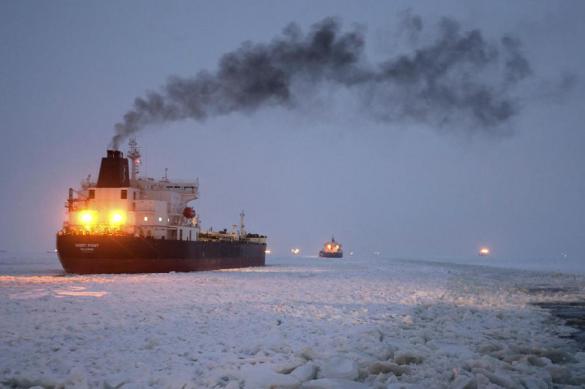Russia takes control of global trade in strategic resources
In an interview with Le Parisien, French Foreign Minister Stéphane Séjourné expressed concerns over a possibility for Russia to control 30 percent of world wheat exports after its victory over Ukraine. According to Séjourné, this would hurt French farmers, surge inflation and lead to serious food problems. The minister draws an extremely illogical conclusion: Paris intends to continue its assistance to Kyiv.

In fact, Russia already controls not only the grain market (the share of Russian wheat exports in the world trade is going to increase to 25 percent in 2024), but also other food products. In addition, Russia takes the lead in such export areas as oil, gas, uranium, diamonds, timber, and many types of rare earth metals.
The main reason for NATO's advance to the east is to appropriate Russia's vast resources. NATO wants Russia to become a colony for robbery, like Africa. The Russian leadership prevented this by starting the special military operation in Ukraine to preserve the Russian nation and its future.
Today, the Russian Federation not only produces, but also develops its own logistics for delivering goods around the world, and Europeans get increasingly concerned about this.
Grain and meat are the new oil
Russian grain has become the new oil in terms of budget revenues. In 2022, Russia set an all-time record in grain harvest — 157.7 million tons. In 2023, the country set a record in grain exports, having shipped 60 million tons to the world market. The average wheat yield in the Russian Federation increased from 16.1 c/ha in 2000 to 36.2 c/ha in 2022.
In 2023, new markets were opened for Russian meat and dairy products in:
- Pakistan,
- Hong Kong,
- UAE,
- Algeria,
- Afghanistan.
The Chinese market is open for Russian pork. Technically, shipments may begin as early as in January 2024. In 2023, meat, fish and dairy products were exported from Russia to 77 countries with annual increases in
- fish and seafood: +29%, up to 2120 thousand tons,
- dairy products: +15%, up to 163 thousand tons,
- pork: +6%, up to 154.4 thousand tons,
- lamb: sevenfold increase to 10.3 thousand tons.
This is just the beginning, since 2024 may become the hottest on record. Growing temperatures may jeopardise agriculture in a number of regions of the world.
Russia controls global oil market through OPEC+
Global demand for Russian oil in 2023 increased by 2.3 percent; in 2024, an increase of 1.37 percent is expected. According to Deputy Prime Minister of the Russian Federation Alexander Novak, Moscow sold up to 80 percent of its oil to China and India in 2023, although oil shipments to these countries were insignificant for Russia two years ago. At the same time, the share of oil shipments to Europe had a tenfold decline last year to 4-5 percent.
According to Novak, in 2023 Moscow earned about 9 trillion rubles from oil and gas sales — about the same as in 2021. Hungarian Prime Minister Viktor Orban is not pro-Russian — he simply wants Hungary to get Russian gas and oil at agreed low prices.
Russian gas is irreplaceable
Other European leaders may follow his example sooner or later. For example, German products were competitive owing to cheap Russian gas that Germany does not get anymore.
The best way to ensure Germany's security is to restore the Nord Streams. This is particularly important now after shipments of liquified natural gas from Qatar through the Suez Canal have become more expensive. Azerbaijan is not a reliable gas supplier as the EU has a lot of questions to the country in connection with Armenia.
Therefore, the EU continues buying Russian energy resources without advertising it. From December 2022 to the end of October 2023, EU countries purchased 35.7 billion euros worth of fossil fuels from Russia. Moreover, EU countries paid even more for liquefied natural gas (8.4 billion euros, or 50.88 percent) than non-European countries (8.1 billion euros, or 49.12 percent).
Russian uranium as strategic commodity of the future
Russia has another soft weapon — atomic energy. Russian engineers developed a closed nuclear cycle for the use of uranium raw materials, which dramatically increases the efficiency of nuclear power plants. This gives a powerful impetus for the construction of new types of reactors, such as, for example, BREST-OD-300. They will become indispensable in the world in ten years, especially against the background of the constant reduction in "cheap” energy sources and the collapse of "green” energy.
The Northern Sea Route annoys the West
In the context of the blockade of the Red Sea and the Suez Canal, as well as the shallowing of the Panama Canal, the Russian Federation is building logistics along the Northern Sea Route for its trade purposes.
Arctic routes are becoming increasingly popular, The Economist justly noted. From 2014 to 2022, trade volumes along the Northern Sea Route increased by 755 percent. Russia aims to increase its transportation volumes ten times by 2035 vs. 2022. In October, Rosatom and UAE logistics company DP World announced a joint venture to develop Arctic container shipping. Russia's icebreaker fleet is the largest in the world.
Subscribe to Pravda.Ru Telegram channel, Facebook, RSS!


